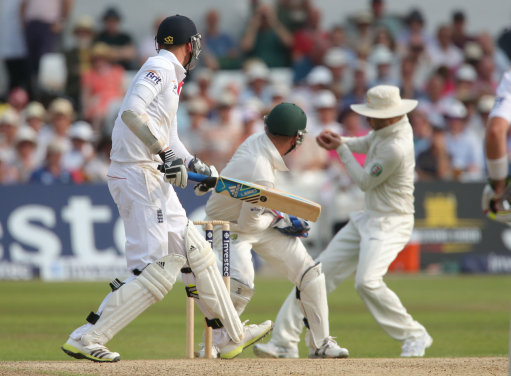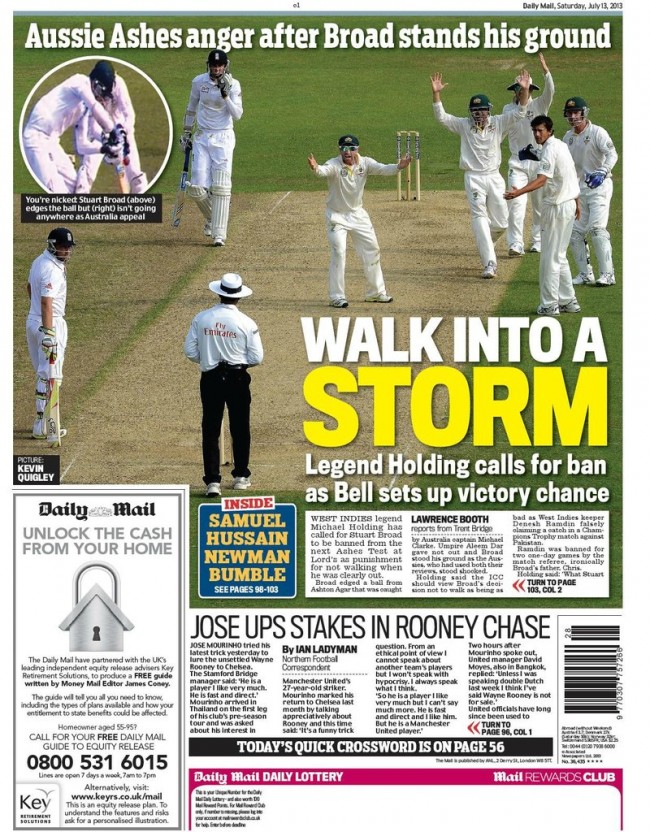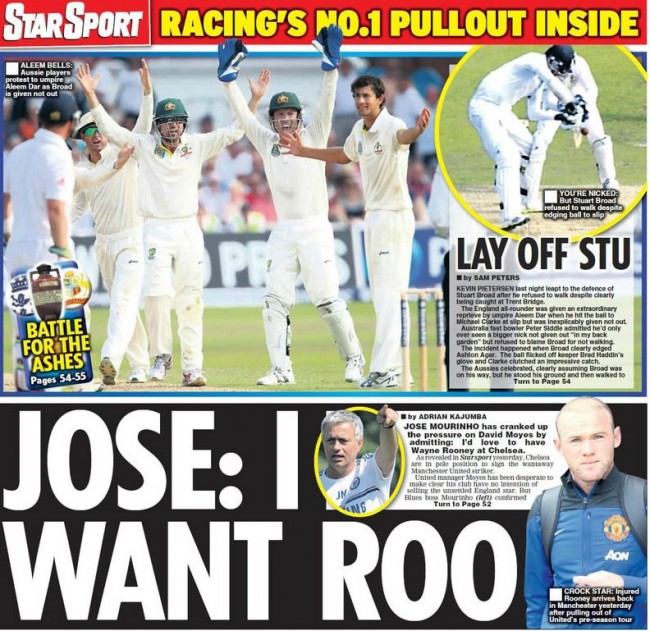The Ashes: (almost) everything Stuart Broad learned about walking he learnt from watching Australia
UMPIRE Dar stuffed up in the Ashes. he missed a clear edge. England batsman Stuart Broad didn’t walk. He stood his ground and waited. Not out. Dar’s error was compounded by the troubled decision review system.
Australia complained. But Broad stood his ground.
The English newspaper react:
With a football-loaded pun
With a winning pun
With a call to leave Stu alone
With a call to ban the player for, erm, obeying the rules
But what about those Australians? They played on and played the game. Good on them. It’s not as if they walk when out:
Michael Holding’s Test career was just three games old in Sydney, 1975, when Ian Chappell clearly edged a delivery through to wicketkeeper Deryck Murray. The umpire, Reg Ledgwidge, was unmoved, while the batsman fidgeted with his gear, behaving as if nothing untoward had happened. The big pacer, who would go on to terrorize batsmen the world over, “slumped to his haunches and wept with anger,” according to captain Clive Lloyd. It was some time before he agreed to continue bowling….
Broad will begin the fourth day on 47. If England go on to win the game and Broad’s bonus runs turns out to be pivotal to the victory, he should in no way be vilified because the umpire didn’t send him on his way when he should have. The Australians should understand because they know they would have done the same.
But one Aussie did walk. It was against Sri Lanka in the 2003 World Cup Semi Final. In WALKING TO VICTORY by Adam Gilchrist, the great player tells us:
Then, to see the umpire shaking his head, meaning, “Not out”, gave me the strangest feeling. I don’t recall what my exact thoughts were, but somewhere in the back of my mind, all that history from the Ashes series was swirling around. Michael Vaughan, Nasser Hussain and other batsmen, both in my team and against us, who had stood their ground in those “close” catching incidents were definitely a factor in what happened in the following seconds. I had spent all summer wondering if it was possible to take ownership of these incidents and still be successful. I had wondered what I would do. I was about to find out.
The voice in my head was emphatic.
Go.
Walk.
And I did.
Of course, the guys back in the viewing room were a bit stunned at what I’d done. Flabbergasted, really, that I’d do it in a World Cup semi.
Michael Bevan was out first ball of Jayasuriya’s next. Five for 144. We could see the expression on Bevan’s face from the television replays. “Oh, no!” He couldn’t believe it. He came into the rooms pretty pissed off. He’s not a guy to carry on, so he just went into the change room out the back and let off some steam before rejoining us to watch the game in silence.
That was when I really started to doubt what I’d done. I was looking around at the guys: I wonder if they’re thinking, “Jesus, Gilly, what’d you do that for?” Bevan showed perfectly why you don’t walk – because you’re likely to cop a rotten decision like his and you don’t get to walk in reverse.”
I was concerned my walking might have embarrassed umpire Rudi Koertzen by going against his call, so when we took the field I made eye contact with him at square leg just before the first ball was bowled. He nodded his head and sort of clapped his hands. That made me feel a bit better.
Ricky Ponting briefly considered calling Adam Gilchrist back to the crease on Thursday after his vice-captain wrongly gave himself out, but he will not ask Gilchrist to reconsider his walking policy in case the gentlemanly instinct costs Australia more dearly.
Ponting, Gilchrist and umpire Jeremy Lloyds were all left bewildered during Australia’s six-wicket victory over Bangladesh when Gilchrist’s instinctive reaction was to terminate his innings after hearing a noise and watching the ball balloon to first slip.
Ponting immediately thought Gilchrist was not out, and the replays showed he missed the ball by some margin as it scooted out of the footmarks and landed with slips fieldsman Khaled Mahmud off the bowling of Tapash Baisya.
Play to the limit of the rules. And write your memoirs later. However wrong it is, the umpire’s decision is final…
Posted: 13th, July 2013 | In: Sports Comment | TrackBack | Permalink







